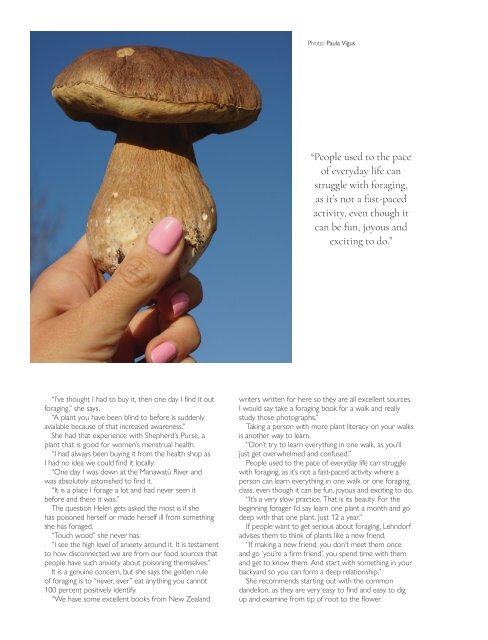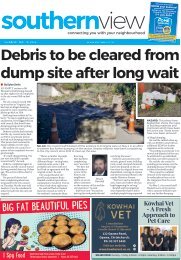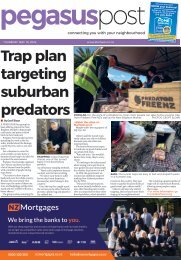Create successful ePaper yourself
Turn your PDF publications into a flip-book with our unique Google optimized e-Paper software.
Photo: Paula Vigus<br />
“People used to the pace<br />
of everyday life can<br />
struggle with foraging,<br />
as it’s not a fast-paced<br />
activity, even though it<br />
can be fun, joyous and<br />
exciting to do.”<br />
“I’ve thought I had to buy it, then one day I find it out<br />
foraging,” she says.<br />
“A plant you have been blind to before is suddenly<br />
available because of that increased awareness.”<br />
She had that experience with Shepherd’s Purse, a<br />
plant that is good for women’s menstrual health.<br />
“I had always been buying it from the health shop as<br />
I had no idea we could find it locally.<br />
“One day I was down at the Manawatū River and<br />
was absolutely astonished to find it.<br />
“It is a place I forage a lot and had never seen it<br />
before and there it was.”<br />
The question Helen gets asked the most is if she<br />
has poisoned herself or made herself ill from something<br />
she has foraged.<br />
“Touch wood” she never has.<br />
“I see the high level of anxiety around it. It is testament<br />
to how disconnected we are from our food sources that<br />
people have such anxiety about poisoning themselves.”<br />
It is a genuine concern, but she says the golden rule<br />
of foraging is to “never, ever” eat anything you cannot<br />
100 percent positively identify.<br />
“We have some excellent books from New Zealand<br />
writers written for here so they are all excellent sources.<br />
I would say take a foraging book for a walk and really<br />
study those photographs.”<br />
Taking a person with more plant literacy on your walks<br />
is another way to learn.<br />
“Don’t try to learn everything in one walk, as you’ll<br />
just get overwhelmed and confused.”<br />
People used to the pace of everyday life can struggle<br />
with foraging, as it’s not a fast-paced activity where a<br />
person can learn everything in one walk or one foraging<br />
class, even though it can be fun, joyous and exciting to do.<br />
“It’s a very slow practice. That is its beauty. For the<br />
beginning forager I’d say learn one plant a month and go<br />
deep with that one plant. Just 12 a year.”<br />
If people want to get serious about foraging, Lehndorf<br />
advises them to think of plants like a new friend.<br />
“If making a new friend, you don’t meet them once<br />
and go ‘you’re a firm friend’, you spend time with them<br />
and get to know them. And start with something in your<br />
backyard so you can form a deep relationship.”<br />
She recommends starting out with the common<br />
dandelion, as they are very easy to find and easy to dig<br />
up and examine from tip of root to the flower.


















